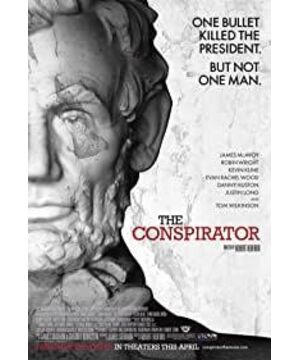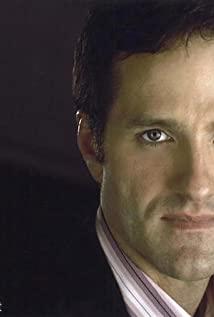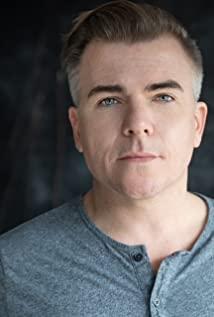The film is mainly cut from the fate of a small person, Mary Sowart (who is considered to be a female accomplice in the assassination of President Lincoln). In times of war, civilians have the right to be tried by a jury.
Lincoln's assassination took place on April 14, 1865, and this setting makes sense. The U.S. Army had just won the Civil War, but in the eyes of the government, which urgently needed to eliminate the remaining resistance forces, the Civil War could not be said to be over. Cicero's famous saying "Laws are silent in time of war" explains the current state of American law at the time. During this period, Lincoln became the first president of the United States to be assassinated, and Mary, a small hotel owner, became the first woman in American history to be sentenced to death. But this Suvat case caused quite a stir at the time, and finally rewrote American law. American law is to move forward step by step with the big lawsuits (such as the famous Simpson case), but compared to a certain country, I will not say anything.
Before Lincoln's assassination, people were still rejoicing in the coming of peace, and as Senator Johnson told Secretary of Operations Stanton, "It is time to heal the wounds of the nation, not to continue to make wars."
Secretary of Operations Stanton,
however, was incensed by the complicity of the assassins, and the government adopted a military court to investigate, and the Secretary selected nine of his most trusted officers to serve as judges, all from the United States. Even the chairman of the investigative committee was chosen by him from among Lincoln's coffins. Because the assassination of the President provoked public outrage, the accused Mary and other accomplices (suspects) had no inference of innocence, no burden of proof, no jury, and no appeal.
There is no difference between good and evil in the characters in the film. For the minister or most northerners at the time, "compatriots in the whole country want to find out about this unfortunate incident and end it as soon as possible. Therefore, it is good for everyone to finish it as soon as possible." (The so-called everyone, of course, does not include the defendant. --senator)
The government was also worried about a counterattack in the South, as well as various post-war unease and social fears. For the sake of peace in his heart, the chief of operations said that he worked hard "as always". He will do anything to ensure victory, to appease the people of the United States who have lost their families and their presidents. He believes that "the peace brought about by this trial will be more useful than any treaty, it will deter the South from trying to use any more tricks, and the North will not want to seek revenge."
In fact, Minister Stanton also has order (law) and justice in his heart, just like when he asked Aiken lawyer, "Is it difficult that you don't want order to be restored and justice to be served? And you're just worried about the killer's rights?" As a U.S. citizen , he also firmly believes in "natural human rights", but "when our country faces the key to its survival, they do not deserve any power".
In Stanton's own words, "I want all these people to be put to death, and then all forgotten." When he learned that the majority wanted a more merciful sentence, he said ruthlessly, "Their [committee] has made up their minds. Then let's change them."
Senator
Jensen is not opposed to the Secretary of War's consolidating victory, but he thinks Stanton's approach is to perpetuate fear, spreading messages such as "under the drinking water" poisoning, setting fires in cities, spreading yellow fever virus" and "terrorizing the whole country" to make people dependent on the government.
He believes that it is too barbaric to use military courts to try civilians, and that the accused should also enjoy equal treatment and should have the right to defend themselves. If the government cannot give a fair trial to a defendant who is already in a weak position, then such a trial is "unconstitutional", an abuse of government power, and a repression and persecution of individuals.
He complained about this "unconstitutional" trial, "We all mourn the loss of a great man, but in our grief, we must not lose our judgment and turn the trial into a medieval inquisition."
"If Our founding fathers wanted an autocracy, and the president and his secretary of war could, of course, abuse their power at will, but they created the Constitution, which used laws to limit power from being abused, in order to prevent such a situation today. occur."
However, considering that he is a southerner, and there is no chance of winning in a trial led by northerners, Jensen made Aiken, a retired captain of the Northern Army, as his assistant, and then let Aiken take over the post of defense attorney. .
Defense Attorney
Aiken Aiken was a war hero, Captain of the United States Army, and retired lawyer.
At first, he was not willing to serve as a defender. Like other newspaper readers, he identified Mary as an accomplice in the assassination of the commander-in-chief, and defending her was the enemy of the people. But the senator told him that defending the accomplice did not require him to "betray", but only required him to abide by the professional ethics and oath of a lawyer and "do what a lawyer should do as a lawyer."
In the process of defending Mary, he also gradually entered the role, but the witnesses he called were either jailed or threatened, and the prosecution witnesses lied at will. This made him aware of the injustices and violent trials suffered by accomplices.
The government's all-out charge against Mary was based on three actions: first, the defendant knew Booth; second, she was alleged to have instructed Lloyd; and third, she could not recognize Penny. Although these three acts can be easily falsified, they still cannot shake the foundation of the case, indicating that the government department insists that she is an accomplice based on hatred. The main reason why Mary was listed as an accomplice was not in the above three acts, but because of her son John Sowart, a fugitive who was involved in planning the assassination.
Aiken himself was expelled from the club he frequented for defending his accomplices, and he was not understood by his girlfriend. He approached the minister, who said, "My only consideration is to preserve the future of the United States." He uttered this classic line: "If my own rights are not guaranteed, why should I fight for the Union?
" At that time, the roles of Aiken and Jensen were completely reversed. As Jensen thought at the beginning, he believed that Minister Stanton's method of maintaining order was not to pursue justice, but to seek revenge. It is undeniable that, as a wartime hero, Aiken himself cared about the security and stability of the country, but now he is more concerned with the natural rights of individuals. As a lawyer, he upholds a solemn constitution that protects people from injustice. Otherwise, "through those government officials, they make up a crime, and you and I may end up the same."
Unable to persuade John Sowart to turn himself in to clear Mary's innocence, at the juncture of life and death, Aiken wants to apply for a habeas corpus for Mary to stand trial in civil court. He found the free-thinking Judge Willing (also a judge personally appointed by President Lincoln) and gave the old man a constitutional lesson.
"The purpose of the Constitution...is to protect the rights of all people, whether in peacetime or in wartime."
"The duty of lawyers is to protect the innocent from legal injustice and protect the weak from oppression. At the same time, when necessary, you must step up and correct your mistakes."
But just as the tide turned, the minister executed the four accomplices because the successor president had rescinded Judge Willing's habeas corpus. The plot is really twists and turns, and it makes people's minds go back and forth.
Later, Mary's son John Sowart turned himself in. He left his mother's relics to Aiken and said to Aiken, "You are more like her child than I am." In the
end
, Aiken himself said that the conclusion cannot be Judge only by law.
Although the official official history records such things, there is another letter history among the people. In fact, history is still very fair. It does not rely on orthodoxy to succeed or fail. Cases have been turned over and over like the pages of a book.
A year after Mary Sowart, the Supreme Court unanimously passed: "Even in times of war, civilians have the right to be tried by jury."
Because a North and South jury could not agree on John Sowart's case , and he was acquitted.
After leaving the judiciary, Freddie Aiken became the first editor-in-chief of city news at the then fledgling Washington Post.
View more about The Conspirator reviews











